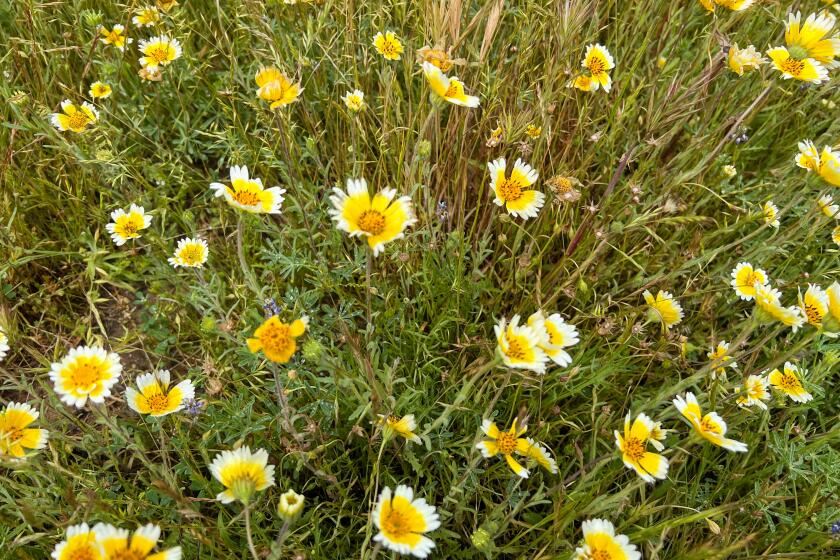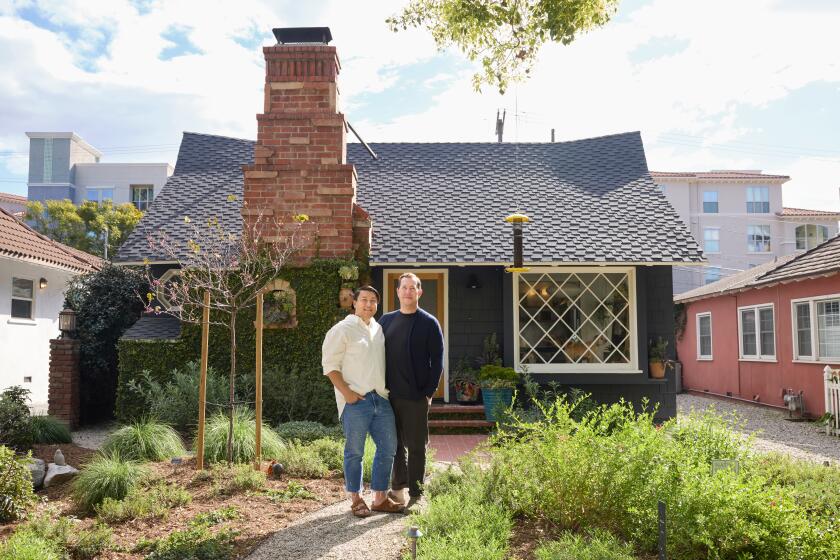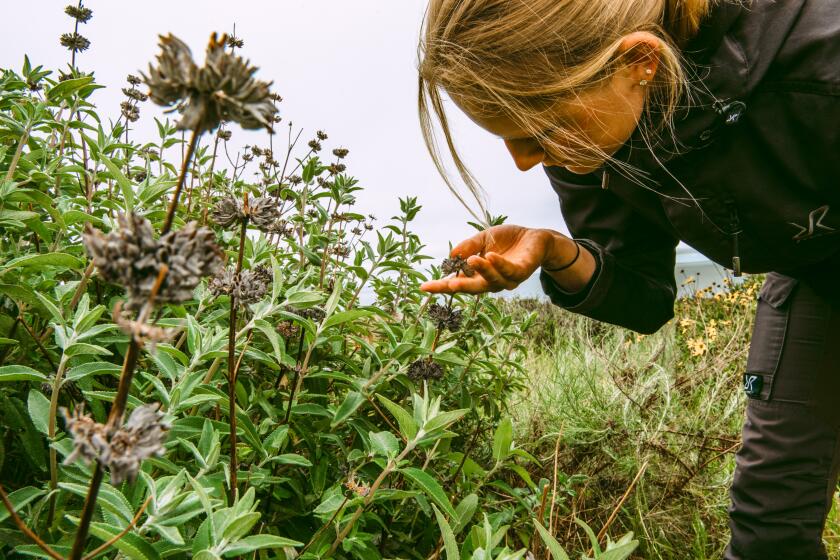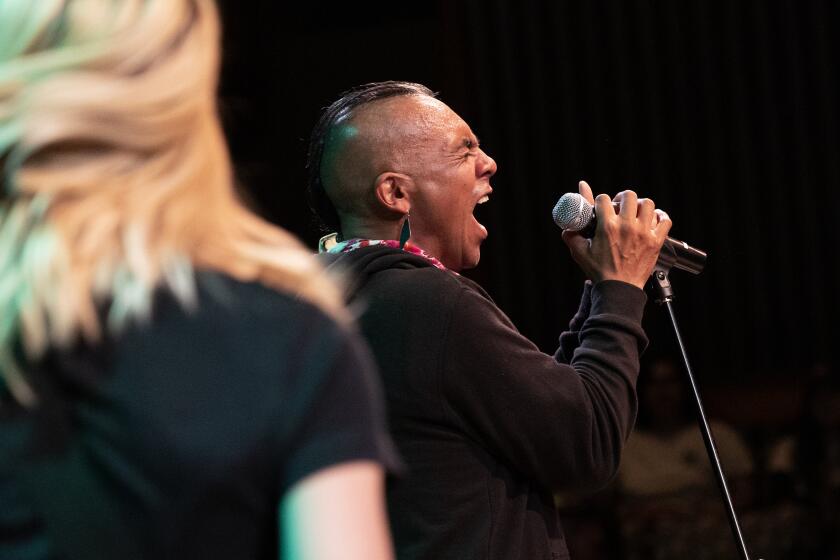How a gardening novice tackled urban farming
Steven Wynbrandt sticks his hand deep beneath the layers of straw that blanket his enormous compost heap and pulls out a fistful of black gold, sweet and earthy.
“Look at this soil,” Wynbrandt says with excitement as his fingers open, revealing his secret recipe for compost: decomposed dairy cow manure, alfalfa, yarrow, camomile, stinging nettle, oak bark, dandelion and valerian flowers. “I’m an alchemist.”
PHOTOS: The Wynbrandt backyard
As further proof that compost is to gardening these days what grass-fed beef and gluten-free gourmet foods are to the world of food, the Wynbrandt compost heap photographed by the Los Angeles Times would later sell through word of mouth for $1 a pound. Beyond his emerging role as one of L.A.’s kings of compost, Wynbrandt, 32, also leads gardening workshops and teaches classes on how to make better soil — all the more impressive given the fact that just three years ago he was a gardening novice.
His journey began in 2009, when, as a surfer, teacher, musician and self-described “spiritual seeker,” he returned home after traveling for four months in Central America and moved back in with his mother in West L.A. Looking through her kitchen window, he had an epiphany.
“I wanted to become more self-sufficient and know where my food comes from,” he recalls. He wanted to grow his own food free of pesticides and other chemicals. He wanted to become a farmer.
“He had never planted anything in his life,” says his mother, June Wynbrandt. “He might have put an avocado seed in a jar when he was young, but that’s about it.”
Still, Steven attacked the shade-covered, weed-choked yard with a vengeance. When six trees needed to be pruned, he donned bike helmet and rock climbing harness, climbed 30 feet high and cut the branches himself with a chain saw. Eventually he had four trees cut down completely to bring in the sunlight needed to grow food. (“That was very difficult for him,” his mother says.)
For three weeks, he worked 14 hours a day, filling his neighbors’ green bins and selling the cut logs he accumulated. He stripped the leaves from the tree and added them to a compost bin the size of a bedroom he built in the side yard. He brought seaweed from the beach and secretly collected 3,000 pounds of food scraps from a raw vegan restaurant at midnight for three months. The alchemy was underway.
Asked if carting 300 wheelbarrows of manure to his backyard and making 25,000 pounds of compost might be viewed as obsessive, Wynbrandt responds: “I’m not obsessive. I’m just doing it right.”
Once his clay soil was amended with his homemade compost, Wynbrandt attended gardening workshops and tapped the knowledge of others, including the Westside Permies, who help people grow edible gardens. He attended lectures by veteran farmers such as Jack McAndrew, a Pacific Palisades-based authority on biodynamic farming, an approach that fuses agriculture with spirituality.
Wynbrandt says his roots in Judaism and his years at Humboldt State University deeply influenced his stewardship for the Earth.
“There is a Hebrew phrase, Tikkun olam,” he says. “It means ‘Heal the world.’ That’s what I’m trying to do.”
Wynbrandt eventually grew more food than he ever thought possible. On 3,000 square feet, more than 20 crops spill out of 13 beds, each 15 feet long. Walk the aisles now and you will find cabbages, Brussels sprouts, broccoli, leeks, collard greens, onions, carrots, asparagus, even quinoa. Over the summer, he grew more than 200 pounds of Brandywine tomatoes along with heirloom and Sun Gold cherry tomatoes. Around the perimeter of the garden, he planted 16 fruit trees — navel orange, pomegranate, avocado, peach, dragonfruit and fig among them — to create a sound barrier from the traffic on nearby Overland Avenue.
“He is unusual,” says McAndrew, 77. “He’s a very special human being. He has great enthusiasm to learn. I brought a load of manure over to his house and taught him how to make biodynamic compost. Now he’s made 15 tons. In the last six months he has accomplished what it took me 10 years to learn.”
Last month Wynbrandt prepared a Thanksgiving salad of baby greens, Swiss and golden chard, arugula, red winter kale, Bull’s Blood beets and romaine lettuce — all from his garden.
Wynbrandt shares his surplus with friends and family as well as with the Sova food pantry in West Hollywood, where his mom volunteers.
RELATED: Composting do’s and don’ts from the pros
If home gardeners were to email Wynbrandt for his advice, his suggestions would be simple: “Grow what you love to eat. Seek people in your neighborhood and microclimate, and find out what they have grown with success. Consult the UC Extension planting schedule and try to use the best compost you can, whether you make it yourself or not.”
It’s advice that worked for him, and now when June Wynbrandt looks out her kitchen window, she is blessed with a spectacular view of a garden that can sustain her. “It’s more than beautiful,” she says. “It’s magical.”
For an easy way to follow the L.A. scene, bookmark L.A. at Home and join us on Facebook, Twitter and Pinterest.




